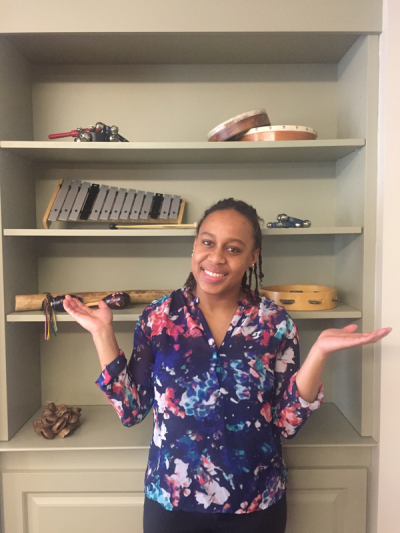


1. Why did you choose music therapy?
I grew up loving music and the way it can make a person feel. I love getting to know people and becoming someone they feel comfortable with. In University, I knew that I wanted to study music but I also knew that I did not want to simply teach or perform. I wanted to help people and connect with them in a way only music can offer. Pursuing music therapy fulfilled that very passion and continues to fulfill that passion here in Kingston.
2. Why do you think music is effective as a form of therapy?
One of the fundamental things we learn as music therapists is to meet someone “where they are.” which is essentially using and responding to what they have to offer in a session rather then putting them in the box of their diagnosis. What this means is, music therapists use the elements of music (e.g. harmony, dynamics, tempo, rhythm, etc.) to connect, respond, and engage in the moment. In partnership with this facilitation by an Accredited Music Therapist, music has its own benefits. It is an experience that when engaged can activate and simulate the entire brain. It is the partnership of these two elements, 1) Facilitation by an Accredited Music Therapist and 2) Individual responses to music, that make music an effective form of therapy and work toward achievable outcomes (e.g. goals and objectives) or 3) Positive change. The following are tangible examples of what this might look like:
• Listening for the tonal centre of an agitated, screaming child and using musical elements to create structure to what would otherwise be considered “noise.” This may allow the child to understand that you are listening to them and validate their emotions in that moment.
• Singing songs of youth with seniors to allow for the sharing of meaningful thoughts and memories and allow reminiscence. Music and lyric recall allows someone with any form on dementia to be fully present and in the moment.
• Inspiring connection and socialization through individual acknowledgement and positive reinforcement of participatory behaviour through song (e.g. the use of hello and goodbye songs).
• Music can provide comfort and a sense of relaxation to individuals that are agitated. Music listening and analysis can validate unique thoughts and feelings.
• Physiologically, dopamine and serotonin (hormones that control reward and pleasure centres in the brain) are produced when simply listening to music. Additionally, from infancy, our bodies are programmed to respond to rhythm and cycles – both of which are qualities found in music. In this way, musical elements can be manipulated to match breathing patterns, slow heart rates, reduce pain perception, etc.
3. Why did you choose you work in Kingston, ON? What do you enjoy about this community?
Kingston is a beautiful city and I loved the welcoming atmosphere of Kingston and its people. Growing up on an island, I have a deep appreciation for nature and feel at home wherever bodies of water are close by and green open spaces. Simply put, Kingston feels like home. Thank you for welcoming me into your homes and into your, now our, community!

